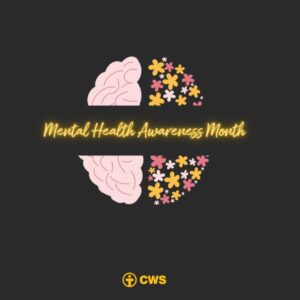
As we close out Mental Health Awareness Month, Jeanne Martin, our Associate Director for Integration, shares her reflections on the importance of connected communities for mental well-being:
In my first role at CWS, serving as an Intensive Case Manager, I often received referrals for clients who were having a more challenging time integrating into their communities. As friends and supporters of our work, you already know that nearly all clients accessing CWS services have experienced one or more traumatic events prior to their arrival in the U.S. including loss of or separation from family, exposure to violence, and food and housing insecurity. In addition to past trauma, the act of migration and resettlement brings new challenges, including integration into a new culture, language differences, discrimination and racism, educational inequities, and limited social capital.
Over the years, I saw and tried my best to support the health and wellbeing of the clients I served. This included continuous learning to understand the unique needs of the individual before me alongside consideration for how best to foster a conversation to ‘check in’ with someone who may or may not be in need, noting the potential for misunderstanding and/or the dismantling of gained trust.
Many refugee communities are hesitant to discuss mental health concerns or access formal mental health care services. I quickly learned that mental health terms and their translations/meaning across languages and cultures can present additional barriers. Over time, I identified the phrase that felt a bit more ‘universal’ in describing mental health and wellness. The phrase “how do you feel in your heart and mind” helped me thoughtfully segue into critical conversations that allowed us to collectively identify potential next steps.
For some, our focus was on rebuilding and connecting with important social relationships that may have been dismantled by war and violence experienced pre-migration. For others, it was a connection to our employment services for assistance in finding employment that utilized their skills and helped them feel like they were contributing to their family and community. And for others, support focused on conversations and education to build understanding around healthy coping strategies and community resources.
Over the past five years, CWS Lancaster has strategically pursued programming to provide targeted mental health and community support. Through our Health and Family Wellness programs, we aim to help clients build a deeper understanding of what stress and trauma look like in the context of migration while developing the tools and connections they need to heal and thrive.
We currently provide five nationally-recognized programs that expand both mental health and community supports for individuals and families across age ranges, including Support for Trauma-Affected Refugees (STAR) program; Mental health interventions for unaccompanied children via Home Study Post Release Services; Good Job, Happy Family, and Preferred Communities intensive case management support; and Youth Mentoring for young adults aged 15-24.
There is no “one size fits all” approach to trauma and mental health. All of these programs are client-centered and provide strengths-based empowerment strategies. While we may see the positive, rippling effects of a mentoring relationship for one young adult, another client may be in need of more connections to specialized services in the community. But across our programs, we are building trusted relationships where young and old can feel safe and work towards long-term health and wellness.
The theme for May 2025, “Turn Awareness into Action,” reminds us that we each have a role to play in supporting personal and community health and wellbeing. Right now, many of our community members are experiencing increased fear and anxiety as recent executive orders & increased enforcement practices across the nation drive deeper wedges in care systems and community connections. We’re hearing from many clients that they are afraid to leave their homes or go to the places they enjoy, regardless of visa status. It is up to us as individuals and organizations to ensure that all of our neighbors feel welcome and safe in our communities.
I know that many of us would struggle to answer “how are you feeling in your heart and mind right now.” But even when things feel heavy, we know that we can reach out to each other in solidarity and compassion. Together we will continue to build communities of belonging.”
— Jeanne Martin, Associate Director, Integration
